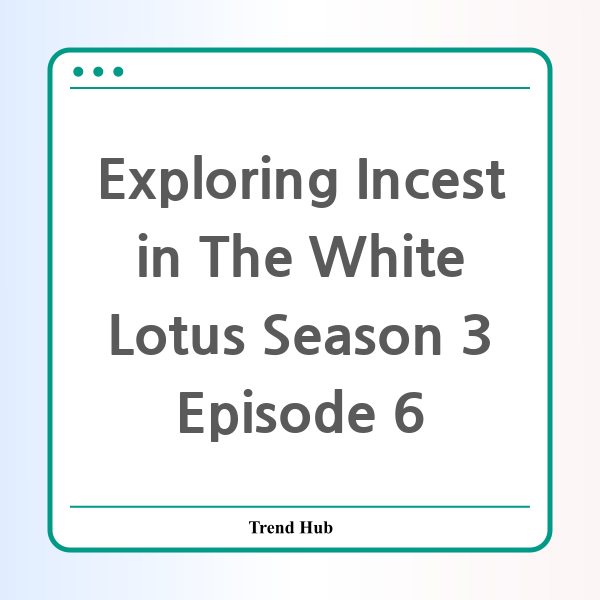* This website participates in the Amazon Affiliate Program and earns from qualifying purchases.

In the latest episode of The White Lotus, Season 3 Episode 6, viewers are left grappling with shocking revelations surrounding the Ratliff siblings, Saxon and Lochlan, as they navigate the blurred lines of familial boundaries. This episode challenges viewers to confront uncomfortable themes, including incest, that have rarely been depicted in contemporary television.
The Ratliff siblings have always exhibited unsettling behavior, leading audiences to speculate on their odd dynamics. Early in the season, viewers noticed their inappropriate comments and intimate behaviors, such as sharing a bed without a door separating them. However, the culmination of these unsettling interactions arrives when the series unveils a troubling encounter between Saxon and Lochlan, which complicates their already fraught relationship.
During a night of partying, the brothers find themselves under the influence of drugs and alcohol, escalating the tension that has been building throughout the series. The episode features a pivotal scene where Lochlan initiates a kiss with Saxon, blurring lines of consent and further deepening their already complex sibling rivalry. This shocking moment raises questions not only about morality but also about the psychological and emotional repercussions of such actions.
Throughout the episode, the creators of The White Lotus delve into taboo subjects, pulling the audience into a moral quandary. The display of incest, or even the suggestion of it, is a rarity in modern storytelling and evokes conversations about its implications. The creators aim to shine a light on topics that are frequently stigmatized, pushing boundaries to explore the darker facets of human relationships.
As experts have pointed out, the depiction of such themes on screen can spark conversations about the prevalence and representation of incest in real life. Understanding the family dynamics at play within the Ratliff family reveals possible roots of their unhealthy interactions. Experts suggest that the parents’ failure to address inappropriate behavior among their children contributes to a toxic environment where boundaries are continually crossed.
In examining the aftermath of the Ratliff encounter, viewers are left to ponder the psychological consequences that often accompany incestuous relationships, including feelings of guilt, confusion, and betrayal. The implications of such actions extend beyond fiction, offering a stark reminder of the complexities surrounding issues of consent, agency, and family loyalty.
The Importance of Addressing Taboo Subjects
In the current climate of heightened awareness around abuse and consent, shows like The White Lotus that tackle these difficult topics can serve a vital purpose. By exploring the uncomfortable, the series encourages viewers to engage in broader discussions about the portrayal of family dynamics, power struggles, and the societal norms that influence them.
Ultimately, this episode not only entertains but acts as a catalyst for conversations surrounding complex human relationships and the moral implications of character choices. As we reflect on the Ratliff siblings' story, we are compelled to ask ourselves: When do familial relationships become problematic, and how can society better understand and address these issues?
Conclusion
The White Lotus has consistently challenged viewers to confront the moral dilemmas surrounding its characters. Season 3, Episode 6, boldly tackles the taboo topic of incest, providing a stark yet necessary lens through which to examine family dynamics. As we await further episodes, it will be intriguing to see how the series continues to unfold these complex narratives.
* This website participates in the Amazon Affiliate Program and earns from qualifying purchases.